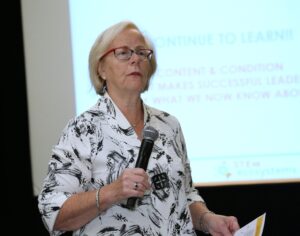Jan Morrison, Co-Designer and Director of STEM Learning Ecosystems and Founder and President of Teaching Institute for Excellence in STEM (TIES)
I was born into STEM—both parents were hot shot STEMists. My favorite teacher was Ms. Amodae, a fireball biology teacher. I taught STEM subjects for 35 years in various locations throughout the country. I founded the Teaching Institute for Excellence in STEM (TIES) 15 years ago and continue to direct this thriving organization.
What do you think can be accomplished within the framework of the Ecosystems that can’t be done (or is more difficult) without it?
STEM for all is ONLY accomplished well and able to be sustained within the context of the STEM Learning Ecosystems. Our Ecosystem model is designed to be inclusive. Its most important feature is that it supports and advances an equity agenda. Communities must provide multiple on-ramps to a lifetime of work as STEM opportunities evolve, and we’re guiding them to do that through the collaborative nature of the Ecosystems. In fact, Andreas Schleicher, OECD Director for Education and Skills and head of OECD’s Program for International Student Assessment, said that this is the single most important work in STEM globally and for the foreseeable future.
What are you working on for the future for the Ecosystems?
Sustainability design and content are crucial. We’re working with Ecosystems to analyze progress and identify gaps that require support, for example, family engagement and public understanding.
Outside of the Ecosystems, what are you involved in?
I’m thrilled to see Fab Labs grow in popularity and usefulness as a teaching tool. Digital fabrication provides students a mechanism to envision a two-dimensional world and build a three-dimensional one. Innovators in education are recognizing the enormous potential that Fab Labs and other maker spaces can bring to students in a school environment. However, educational organizations need training and support as they move toward using digital fabrication as a pathway to STEM teaching and learning. TIES is a partner in providing advice, consultation, classroom implementation, curriculum development, teacher professional development and importantly, standards of quality which schools, teachers, students, parents, community and government can depend on and measure.
STEM education must constantly evolve, and I’m very involved in many developments including the recent Engineering for K-12 Education report and the Next Generation Science Standards. I see a real need for a “Learn and Earn” space that offers all STEM students the opportunity to work in STEM fields while earning credits that have real labor market value as they matriculate at community colleges or universities.
At TIES, we also work with school districts and states throughout the country and internationally to design new STEM schools and curricula as platforms for change.
What’s the most fun and/or rewarding part of your job?
People! All of the work penetrates to children and is enabling them to advance. I want everyone to understand the importance of a college/work ready education for all children. We at TIES are proud to support STEM Learning Ecosystems as we help all children make sense of the world and find themselves STEM literate, STEM capable and excited to make STEM their life’s work.

